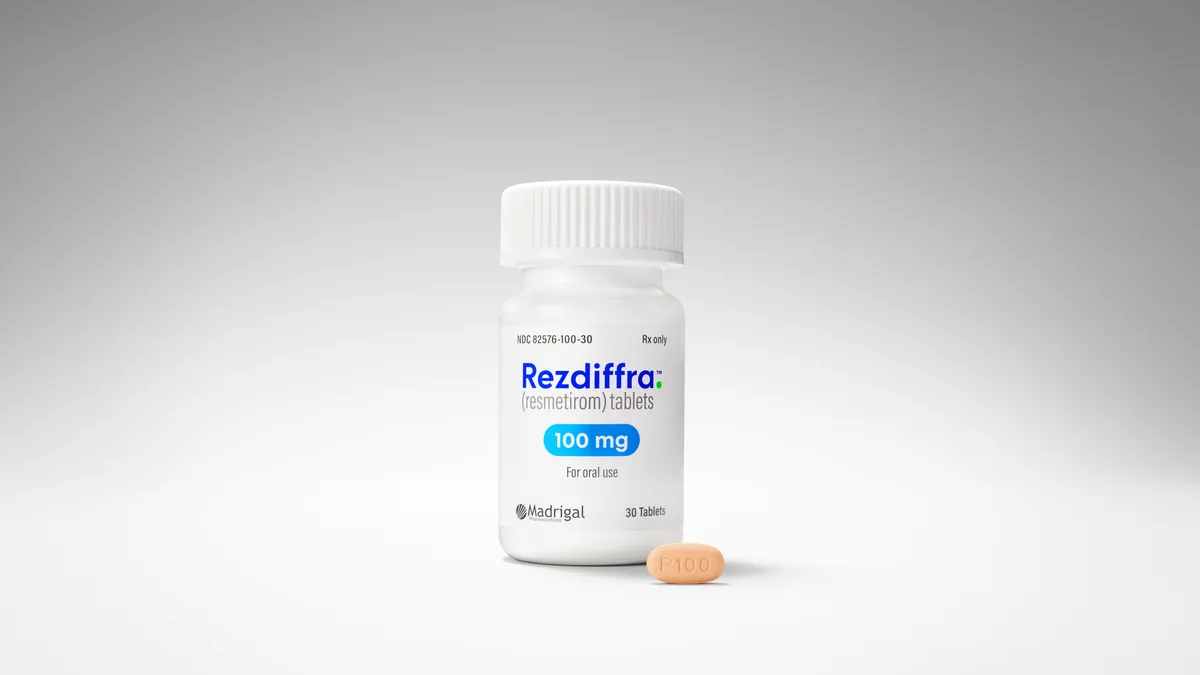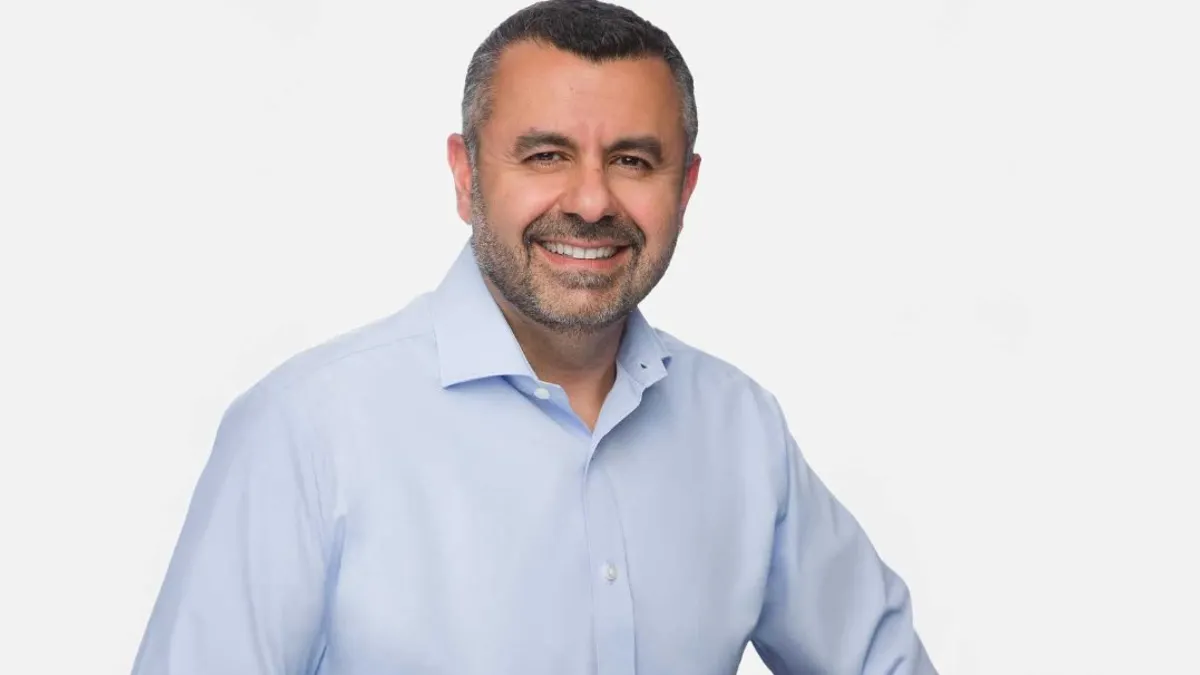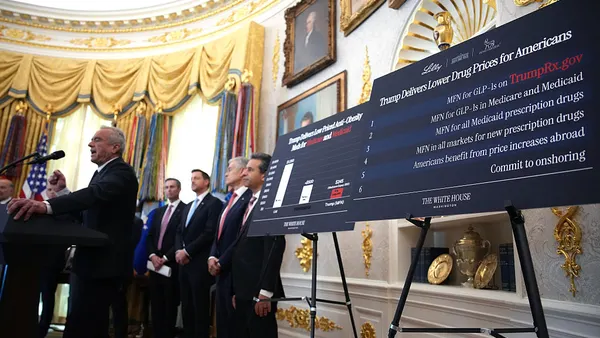The GLP-1 boom isn’t slowing down anytime soon. Prescriptions for overweight or obese adults jumped almost 587% from 2019 to 2024, Healthcare Dive reported, and there’s still a huge untapped patient population representing more market upside.
As pharma’s pipeline explodes with more than 100 new drugs in various stages of development, one barrier to access has yet to be toppled. Medicare and Medicaid do not fully cover weight loss medications, with some exceptions, leaving out millions of potential users.
The Biden administration proposed ending this prohibition in late 2024, but the Trump administration recently axed the idea in April, stating it “did not intend to finalize” the proposed rule. A 2024 fact sheet about the proposal has also since been taken down by the Trump administration.
The move was a blow to the market, but health officials and the Centers for Medicare and Medicaid Services haven’t ruled out covering obesity medications at some point.
Obesity limitations
The government prohibition against covering obesity treatments has been the law of the land for the last 20 years, while states have been able to decide whether to cover these drugs in their Medicaid plans. Only 13 states covered GLP-1 drugs for obesity as of last year, but both Medicare and Medicaid cover GLP-1s for other approved indications, including diabetes or cardiovascular disease.
Allowing the expanded coverage would have cost the federal government $35 billion over 10 years, according to the Congressional Budget Office. Covering anti-obesity medications like GLP-1s would also result in some savings by preventing worsening health outcomes, but those savings would be less than the cost of the drugs, CBO said.
Not everyone agrees the price isn’t worth it.
"It does not align with the goal of reducing overall spending — it is penny wise but pound foolish.”

Wayne Winegarden
Senior fellow, director, Center for Medical Economics and Innovation, Pacific Research Institute
“Access to these drugs can meaningfully reduce the incidence of obesity, which is associated with significant improvements in overall health outcomes,” Wayne Winegarden, senior fellow and director of the Center for Medical Economics and Innovation at Pacific Research Institute, said via email. “Beyond the health benefits, some studies have found that covering obesity medications can reduce overall healthcare spending by reducing the need for expensive surgeries, hospital stays and other medical treatments.”
One 2023 estimate revealed Medicare could save between $175 billion to $245 billion in the first 10 years of covering weight loss drugs if private insurers similarly covered them. Another study found that average medical costs dropped by around $7,500 for patients after starting semaglutide drugs — well above the $5,600 that CBO estimated Medicare would spend on each weight loss drug user.
Market impact
Expanding GLP-1 coverage would also be a boost for obesity market leaders Eli Lilly and Novo Nordisk. Both pharma companies saw a dip in their stock prices when the Trump administration published its decision not to follow through on the proposal.
But that outcome was expected by some health policy experts and analysts, given the Trump administration’s short-term focus on cost-cutting measures across healthcare.
“It is not surprising in the sense that the administration appears to be under-appreciating the value created by innovative drugs,” Winegarden said. “It does not align with the goal of reducing overall spending — it is penny wise but pound foolish.”
Lilly has been pushing for broader coverage of its GLP-1 weight loss med Zepbound, which has helped the large pharma recently overtake Novo’s market leading position. Both companies have a list price of around $1,000 per month for their GLP-1s, making them hard to afford if insurers don’t offer coverage. The two companies are already competing head to head for market dominance by offering cheaper direct-to-patient vials via telehealth platforms and striking deals with pharmacy benefit managers.
Medicare also already has its sights on lowering costs for Novo’s suite of three semaglutide GLP-1 products, which were selected for its price negotiation program in 2027. But both companies are expanding their patient population through new indication approvals, including Novo’s nod for Ozempic in chronic kidney disease, while also developing new delivery methods through oral routes.
A path forward
While Medicare won’t be covering obesity meds in 2026, the Trump administration may take up the issue again down the road. CMS noted in April it was not finalizing the proposal, among others, “at this time,” but the agency also stated it “may address these proposals in future rulemaking, as appropriate.”
HHS Secretary Robert F. Kennedy Jr. also mentioned a potential “regulatory framework” to include coverage of these drugs in an April interview with CBS News. However, he said a change in diet and exercise would be a first-line treatment before people are entitled to an obesity medication. He also harped on the high cost of covering the drugs at the federal level.
But advocates have pointed out that Trump administration officials have made conflicting statements about their support of GLP-1s.
“To date, HHS leadership have sent mixed signals on the issue,” the American College of Gastroenterology said in April. “HHS Secretary [Kennedy] has criticized the drugs, while [Dr.] Mehmet Oz, administrator of [CMS], has praised the benefits of the treatments.”
FDA Commissioner Dr. Martin Makary, stated prior to taking the role that GLP-1s could cost Medicare “a fortune” and divert funds from other medical services, while Oz has promoted weight loss treatments, including GLP-1s, and stated it should be “easy” for people to access the medications.
If the recently published MAHA Commission report is any indication, the Trump administration won’t be pushing for a medication-first approach to tackle obesity anytime soon. While the report mostly focused on childhood chronic health issues, the sections regarding GLP-1s underscore the administration’s focus on dietary choices and food regulations as a first step.
The May report stated that “children are on too much medicine,” and included GLP-1s among a handful of drugs being more frequently used and potentially overtreated.
A handful of Democratic senators wrote to Kennedy in April urging him to reconsider Medicare and Medicaid coverage, calling such an expansion “a critical long-term investment” to improve obesity-related healthcare costs.



















